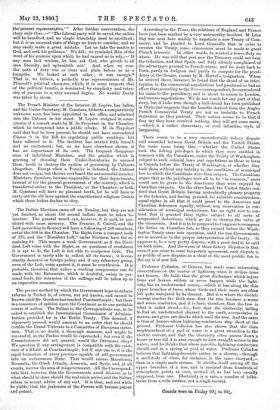The French Minister of the Interior, M. Lepere, has fallen,
:and his Under-Secretary, M. Constans, hitherto a comparatively unknown man, has been appointed to his office, and admitted into the Cabinet in his stead. M. Lephre resigned in conse- -quence of a remark made by M. de Freyeinet in the Chamber, which he interpreted into a public rebuke. M. de Freycinet said that had he been present, he should not have surrendered -Clause 9 in the Bill for regulating public meetings, but have adhered to it. The incident has created little remark and no excitement; but, as we have elsewhere shown, it has an importance of its own. The frequent disappear- ance of individual Ministers, and the practice which is growing of choosing their Under-Secretaries to succeed them, tends to destroy the system of governing by Cabinets altogether. Except when a Premier is defeated, the Cabinet -does not resign, but throws overboard the unsuccessful member. Ministers, therefore, become responsible for their departments, instead of for the general government of the country, which is transferred either to the President, or the Chamber, or both. M. Constans will have no pleasant berth, for he will have to carry out the old laws against the unauthorised religious Orders which those bodies decline to obey.


































 Previous page
Previous page